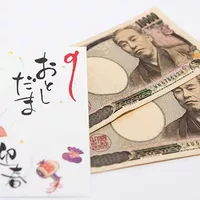小学生 の お年玉 。。。(n4)NewYear'sgiftmoney
しょうがくせい||おとしだま||
Neujahrsgeschenkgeld für Grundschüler ...(n 4) Neujahrsgeschenkgeld
New Year's gift money for elementary school students ... (n 4) New Year's gift money
Dinero de regalo de Año Nuevo para escolares ... (n 4) Dinero de regalo de Año Nuevo
Argent cadeau du Nouvel An pour les élèves du primaire ...(n 4) Argent cadeau du Nouvel An
초등학생의 세뱃돈 ... (n 4) 세뱃돈
Nieuwjaarsgeschenken voor schoolkinderen ... (n 4) nieuwjaarsgeschenken
Noworoczne pieniądze na prezenty dla uczniów ... (n 4) Pieniądze na prezenty noworoczne
Dinheiro para prendas de Ano Novo para crianças em idade escolar ... (n 4) Dinheiro para prendas de Ano Novo
Новогодние подарочные деньги для школьников ... (n 4) Деньги на новогодние подарки
给学生的新年礼金 ...(n 4) 新年礼金
给学生的新年礼金 ...(n 4) 新年礼金
日本 には 、 お年玉 と いう 文化 が あります。
にほん|には||おとしだま|||ぶんか|
In Japan there is a cultural tradition called Otoshidama.
在日本,有一种文化叫做 otoshidama。
日本有一種文化,叫做「乙玉」。
お年玉 は 、 子ども が おじいさん や おばあさん から もらえる お こづかい です。
おとしだま|は||こども||||||||
Otoshidama is an allowance which kids can receive from grandmother or grandfather.
Otoshidama是祖父和祖母给孩子们的零用钱。
乙金是祖父和祖母給孩子的零用錢。
お正月 になると 子ども達 は 、 おとしだま を 楽しみにします。
おしょうがつ||こどもたち|は|||
Kinder freuen sich am Neujahrstag auf Otoshidama.
Children look forward to Otoshidama on New Year's Day.
Дети с нетерпением ждут Отошидаму в Новый год.
新年一到,孩子们就盼望着乙玉。
新年一到,孩子們就盼望著乙玉。
小学生 は 、 1、000 円 から 5、000 円 位 もらえます。
しょうがくせい|は||えん|||えん
Elementary school children receive 1,000 to 5,000 yen.
小学生可领取1,000日元至5,000日元。
中学生 になると 5、000 円 から 10、000 円 に ふえます。
ちゅうがくせい|||えん|||えん
When they become middle school students, it increases by 5,000 to 10,000 yen.
Les frais passent de 5 000 ¥ à 10 000 ¥ pour les élèves du premier cycle de l'enseignement secondaire.
当你成为初中生时,金额从5,000日元增加到10,000日元。
高校生 以上 は 、 10、000 円 位 で 、 もう ふえません。
こうこうせい|いじょう|は||えん|くらい||
Für Schüler der Oberstufe und darüber beträgt die Gebühr etwa 10.000 Yen und wird nicht erhöht.
For high school students and above, they receive about 10,000 yen, no increase.
高中生以上的费用为1万日元左右,以后不再增加。
高中生以上的費用為1萬日圓左右,以後不再增加。
代わり に 高校生 は 、 アルバイト を する ことができる ので お金 は 持って います。
かわり||こうこうせい|は|||||||おかね|は|もって
Im Gegenzug haben Gymnasiasten Geld, weil sie Teilzeit arbeiten können.
Instead, high school students have money because they can work part-time.
相反,高中生可以做兼职并有钱。
相反,高中生可以做兼職並有錢。
お年玉 を あげる 時 は 、 小さな ふくろ に お金 を 入れて 、 表 に 子ども の 名前 を 書いて 渡します。
おとしだま|||とき|は||ちいさな|||おかね||いれて||おもて||こども||なまえ|
When I give the Otoshidama, I put it in a small bag and write the kid‘s name on top and hand it out to them.
送新年礼物时,把钱放在一个小袋子里,在正面写上孩子的名字,然后递过去。
送新年禮物時,把錢放在一個小袋子裡,在正面寫上孩子的名字,然後遞過去。
たいわん に も 日本 と 同じよう な お年玉 の 文化 が ある そう です。
|||にほん||おなじよう||おとしだま||ぶんか||||
It seems that most countries have a New Year's gift culture similar to Japan.
据说,台湾也有与日本类似的新年礼物文化。
據說,台灣也有與日本類似的新年禮物文化。
あなた の 国 に も お年玉 の 文化 は あります か。
||くに|||おとしだま||ぶんか|は||
Does your country have a similar tradition?
你们国家有过年送礼的文化吗?
持って います

